2019年中考英语二轮语法专题讲义+练习:连词(含答案)
文档属性
| 名称 | 2019年中考英语二轮语法专题讲义+练习:连词(含答案) |
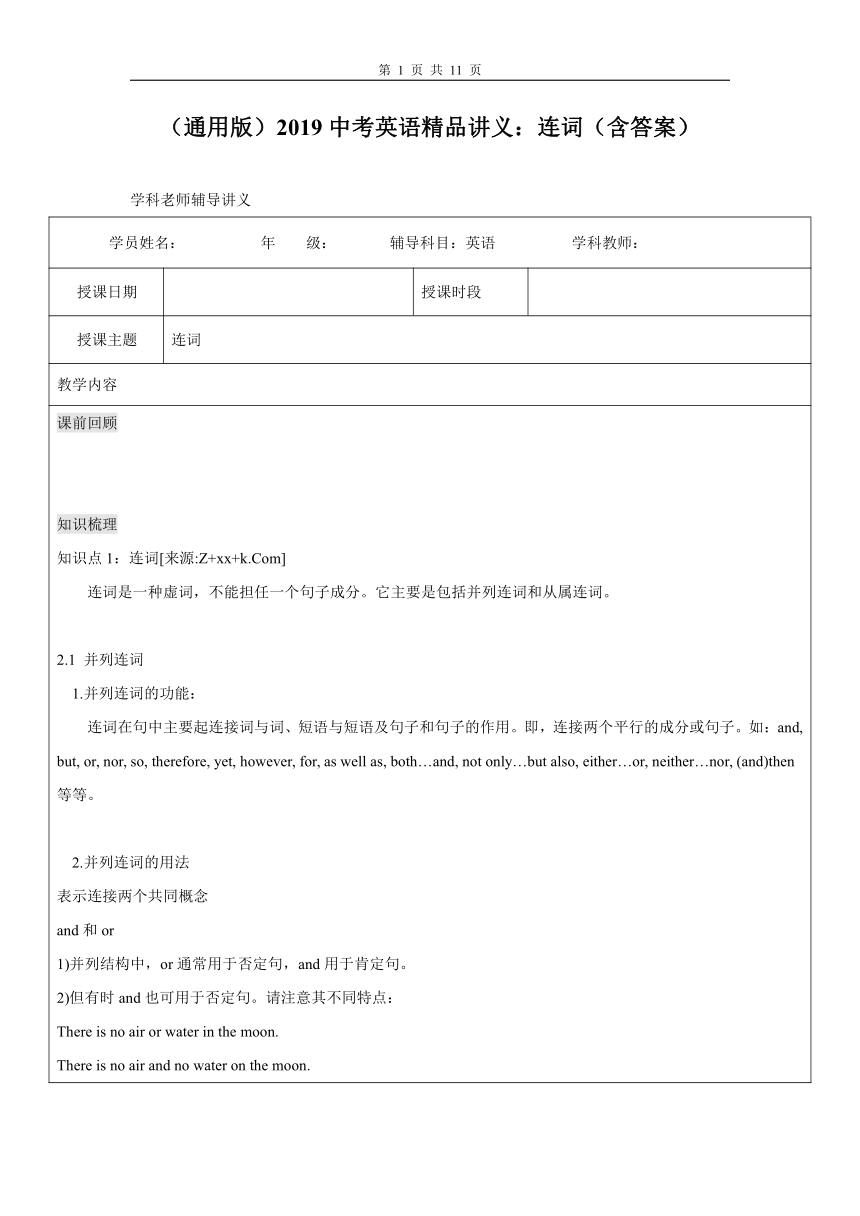
|
|
| 格式 | zip | ||
| 文件大小 | 213.5KB | ||
| 资源类型 | 教案 | ||
| 版本资源 | 人教新目标(Go for it)版 | ||
| 科目 | 英语 | ||
| 更新时间 | 2019-02-22 21:42:22 | ||
图片预览

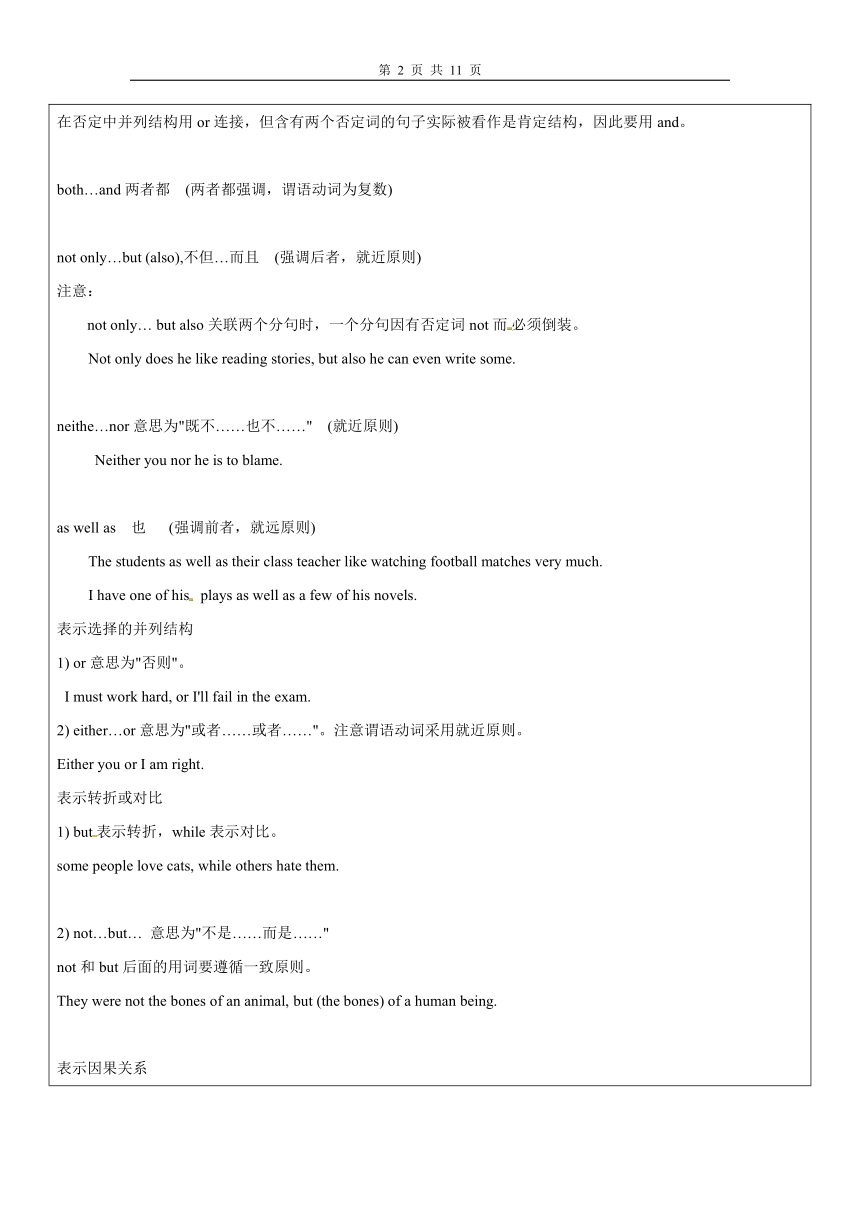
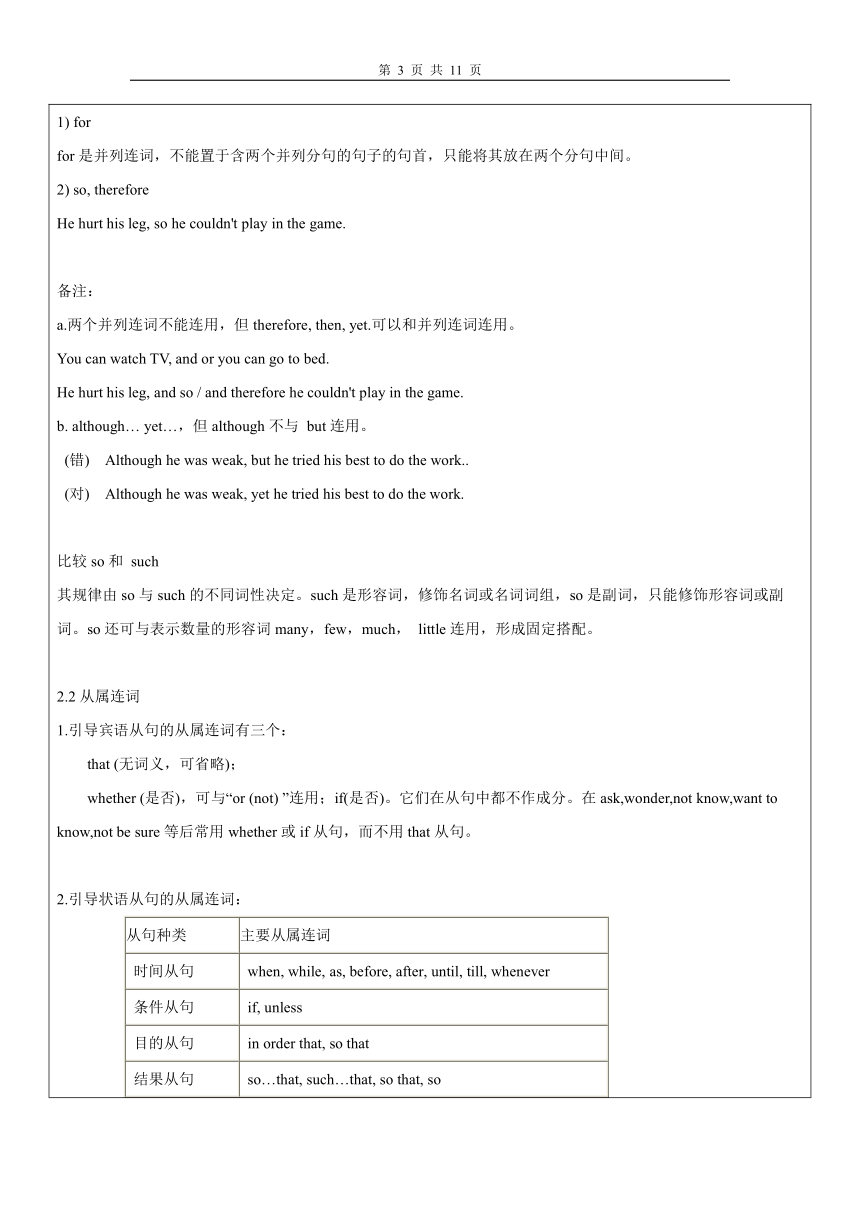
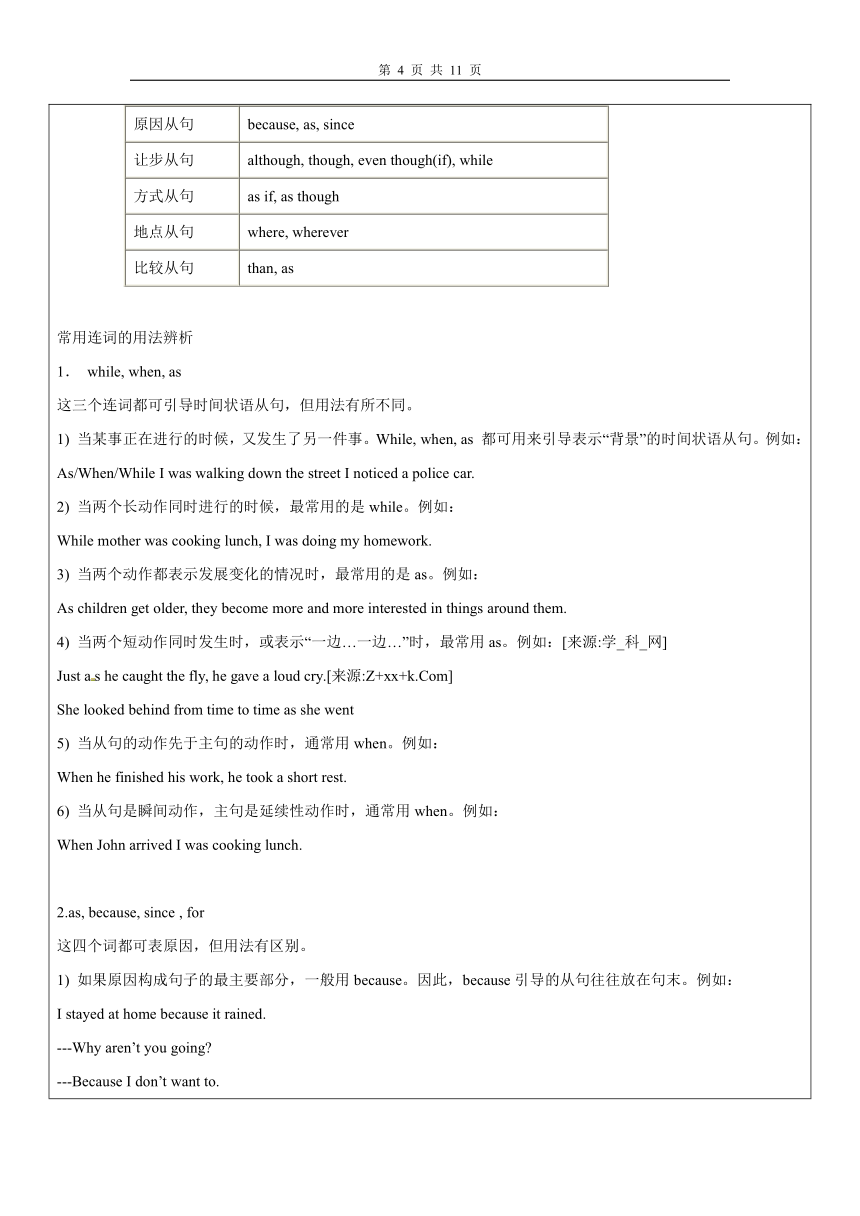
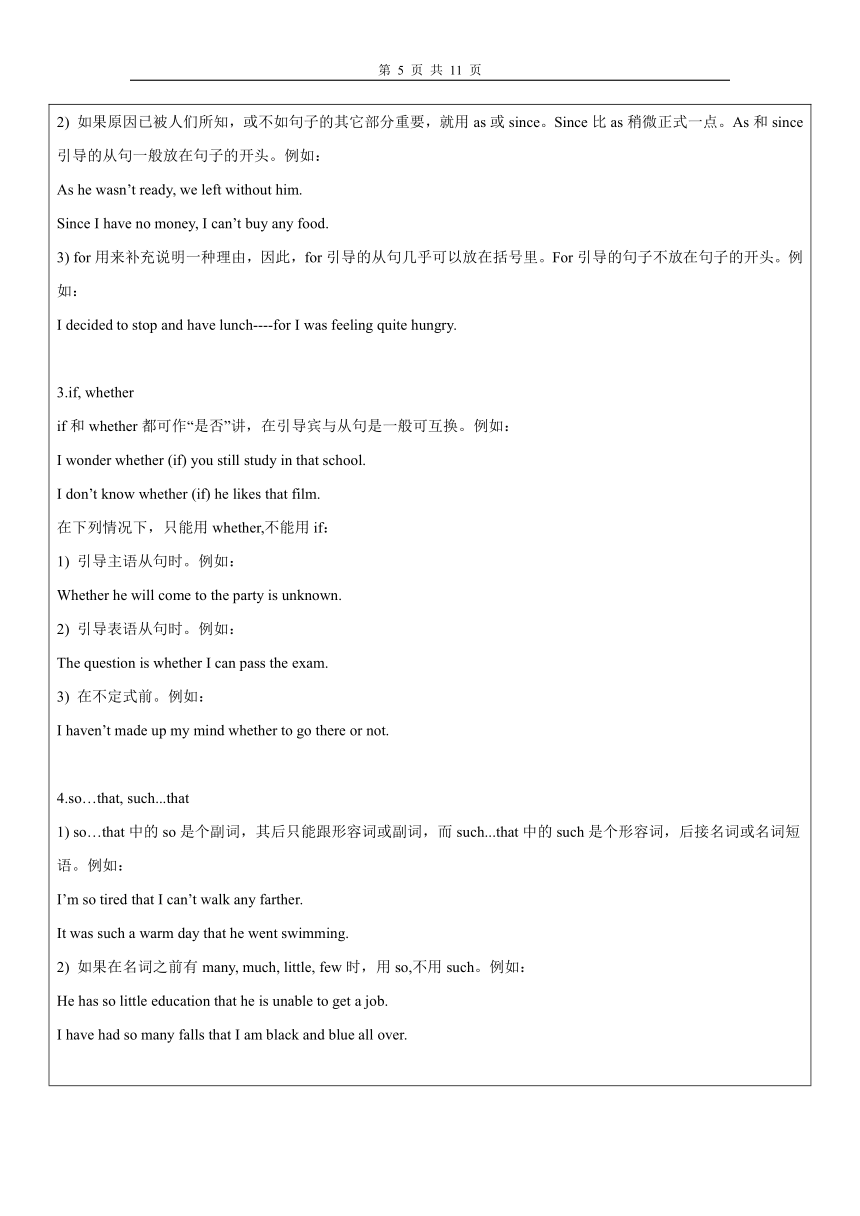
文档简介
第 11 页 共 11 页
(通用版)2019中考英语精品讲义:连词(含答案)
学科老师辅导讲义
学员姓名: 年 级: 辅导科目:英语 学科教师:
授课日期 授课时段
授课主题 连词
教学内容
课前回顾 知识梳理知识点1:连词[来源:Z+xx+k.Com]连词是一种虚词,不能担任一个句子成分。它主要是包括并列连词和从属连词。 2.1 并列连词 1.并列连词的功能:连词在句中主要起连接词与词、短语与短语及句子和句子的作用。即,连接两个平行的成分或句子。如:and, but, or, nor, so, therefore, yet, however, for, as well as, both…and, not only…but also, either…or, neither…nor, (and)then等等。 2.并列连词的用法表示连接两个共同概念 and和or 1)并列结构中,or通常用于否定句,and用于肯定句。 2)但有时and也可用于否定句。请注意其不同特点: There is no air or water in the moon. There is no air and no water on the moon.在否定中并列结构用or连接,但含有两个否定词的句子实际被看作是肯定结构,因此要用and。 both…and两者都 (两者都强调,谓语动词为复数) not only…but (also),不但…而且 (强调后者,就近原则)注意: not only… but also关联两个分句时,一个分句因有否定词not而必须倒装。 Not only does he like reading stories, but also he can even write some. neithe…nor意思为"既不……也不……" (就近原则) Neither you nor he is to blame. as well as 也 (强调前者,就远原则) The students as well as their class teacher like watching football matches very much. I have one of his plays as well as a few of his novels.表示选择的并列结构 1) or意思为"否则"。 I must work hard, or I'll fail in the exam. 2) either…or意思为"或者……或者……"。注意谓语动词采用就近原则。 Either you or I am right.表示转折或对比 1) but表示转折,while表示对比。 some people love cats, while others hate them. 2) not…but… 意思为"不是……而是……" not和but后面的用词要遵循一致原则。 They were not the bones of an animal, but (the bones) of a human being. 表示因果关系 1) for for是并列连词,不能置于含两个并列分句的句子的句首,只能将其放在两个分句中间。 2) so, therefore He hurt his leg, so he couldn't play in the game. 备注: a.两个并列连词不能连用,但therefore, then, yet.可以和并列连词连用。 You can watch TV, and or you can go to bed. He hurt his leg, and so / and therefore he couldn't play in the game. b. although… yet…,但although不与 but连用。 (错) Although he was weak, but he tried his best to do the work.. (对) Although he was weak, yet he tried his best to do the work. 比较so和 such其规律由so与such的不同词性决定。such是形容词,修饰名词或名词词组,so是副词,只能修饰形容词或副词。so还可与表示数量的形容词many,few,much, little连用,形成固定搭配。 2.2从属连词 1.引导宾语从句的从属连词有三个: that (无词义,可省略); whether (是否),可与“or (not) ”连用;if(是否)。它们在从句中都不作成分。在ask,wonder,not know,want to know,not be sure等后常用whether或if从句,而不用that从句。 2.引导状语从句的从属连词:从句种类主要从属连词 时间从句 when, while, as, before, after, until, till, whenever 条件从句 if, unless 目的从句 in order that, so that 结果从句 so…that, such…that, so that, so 原因从句 because, as, since 让步从句 although, though, even though(if), while 方式从句 as if, as though 地点从句 where, wherever 比较从句 than, as常用连词的用法辨析 1. while, when, as这三个连词都可引导时间状语从句,但用法有所不同。 1) 当某事正在进行的时候,又发生了另一件事。While, when, as 都可用来引导表示“背景”的时间状语从句。例如: As/When/While I was walking down the street I noticed a police car. 2) 当两个长动作同时进行的时候,最常用的是while。例如: While mother was cooking lunch, I was doing my homework. 3) 当两个动作都表示发展变化的情况时,最常用的是as。例如: As children get older, they become more and more interested in things around them. 4) 当两个短动作同时发生时,或表示“一边…一边…”时,最常用as。例如:[来源:学_科_网] Just as he caught the fly, he gave a loud cry.[来源:Z+xx+k.Com] She looked behind from time to time as she went 5) 当从句的动作先于主句的动作时,通常用when。例如: When he finished his work, he took a short rest. 6) 当从句是瞬间动作,主句是延续性动作时,通常用when。例如: When John arrived I was cooking lunch. 2.as, because, since , for这四个词都可表原因,但用法有区别。 1) 如果原因构成句子的最主要部分,一般用because。因此,because引导的从句往往放在句末。例如: I stayed at home because it rained. ---Why aren’t you going? ---Because I don’t want to. 2) 如果原因已被人们所知,或不如句子的其它部分重要,就用as或since。Since比as稍微正式一点。As和since 引导的从句一般放在句子的开头。例如: As he wasn’t ready, we left without him. Since I have no money, I can’t buy any food. 3) for用来补充说明一种理由,因此,for引导的从句几乎可以放在括号里。For引导的句子不放在句子的开头。例如: I decided to stop and have lunch----for I was feeling quite hungry. 3.if, whether if和whether都可作“是否”讲,在引导宾与从句是一般可互换。例如: I wonder whether (if) you still study in that school. I don’t know whether (if) he likes that film.在下列情况下,只能用whether,不能用if: 1) 引导主语从句时。例如: Whether he will come to the party is unknown. 2) 引导表语从句时。例如: The question is whether I can pass the exam. 3) 在不定式前。例如: I haven’t made up my mind whether to go there or not. 4.so…that, such...that 1) so…that中的so是个副词,其后只能跟形容词或副词,而such...that中的such是个形容词,后接名词或名词短语。例如: I’m so tired that I can’t walk any farther. It was such a warm day that he went swimming. 2) 如果在名词之前有many, much, little, few时,用so,不用such。例如: He has so little education that he is unable to get a job. I have had so many falls that I am black and blue all over. 5.either…or…, neither…nor, not only…but also…这三个连词词组都可连接两个并列成分。当它们连接两个并列主语时,谓语动词要随相邻的主语变化。例如: Either you or he is wrong. Neither he nor his children like fish. Not only the teacher but also the students want to buy the book. 6.although, but这两个连词不能用在同一个句子中。例如:我们不能说“Although he is over sixty, but he works as hard as others.”这个句子应改为: Although he is over sixty, he works as hard as others.或He is over sixty, but he works as hard as others. 7.because, so这两个连词同样不能用在同一个句子中。例如:我们不能说“Because John was ill, so I took him to the doctor.” 这个句子应改为 Because John was ill, I took him to the doctor.或John was ill, so I took him to the doctor. 3.定语从句、名词性从句也有其自己相应的从属连词,这个在高中会详细讲解,这里不展开。 随堂练习: 1. Which mobile phone would you like to buy, a Nokia an iPhone4 ? A. so B.or C.but D. and 2. Jack was half an hour late for the party he was stuck in a traffic jam. A. unless B. while C. because D. if 3. "Can you help me carry these boxes upstairs?" Mary asked Tom. (合并为一句) Mary asked Tom he help her carry these boxes upstairs. 4. My uncle doesn't have much money. ______he always enjoys himself. A. but B. so C. and D. or 5. The comic strip is _____funny______ readers art fond of it. A. too, to B. so, that C. very, to D. too, that 6. If I don’t finish my homework, my mother will not allow me to play computer games. (保持句意基本不变) I won’t be _______to play computer games_____ I finish my homework. 7.”Have you got ready for the final exam?” Our class teacher asked the students. (合并一句) Our class teacher asked us _____ we _____got ready for the final exams. 8.He didn't realize his mistake ______ he was told about it. A. if B. while C. until D. since 9.The problem is __________will be in charge of our school newspaper. A. who B. when C. what D. where 10.We must do something to protect the earth,_____ we will lose our home. A. or B. but C. so D. and1—5 B C . if/whether, could; A 6—10 B allowed unless; . if/whether had; C A 专题过关 11.The teacher asked us, "Have you finished reading the passage?"(保持句意基本不变) The teacher asked us _______ we ________ finished reading the passage. 12. Don't stay up too late. __ you'll find it hard to get up on time tomorrow. A. or B. but C. and D. so 13. Susan did quite well in the final exam ________ she had missed two weeks' lessons. A. though B. if C. because D. unless 14. Rose went to the car exhibition yesterday. Danny went there, too. (保持句意基本不变) __________ Rose __________ Danny went to the car exhibition yesterday. 15. Does Mike like his new job? Mike's parents wonder. (合并为一句) Mike's parents wonder __________ he __________ his new job. 16. I decided not to buy frozen dumplings the government said they were safe. A.because B. though C. since D. or 17. Fresh water is limited. We can't waste it any more. (合并为一句) Fresh water is limited we can't waste it any more. 18. Please tell us what we should do to protect our environment. (改为简单句) Please tell us do to protect our environment. 19. Work harder, or you'll not succeed in your new job. (保持句意基本不变) work harder, you'll not succeed in your new job. 20. I can’t understand the sentence ____ there are no new words in it. A. if B. until C. though D. because 21. The police asked _____ we saw anybody break into the house to steal things. A. who B. if C. what D. where 22. Billy doesn’t know what happened. Billy doesn’t care what happened. (保持句意基本不变) Billy _____ knows _____ cares what happened. 23. We will remember the picture ______ it is silly, strange and colorful. A. unless B. if C. before D. after 24. Speak louder______ everyone in the meeting room can hear you clearly. A. so that B. in order to C. since D. because 25. There is some food and drinks in the fridge. (改为否定句) There is food drinks in the fridge. 26. If I can’t find my bike, I’ll have to walk to school every day. I find my bike, I’ll have to walk to school every day. 27. I am afraid you won't get the job you're the best. A. if B. as soon as C. because D. unless 28. Put these used batteries into the green bins, it will pollute the environment. A. and B. or C. so D. for 29. the manager can't make the service better, the shop will soon lose all the customers. A. When B. If C. Because D. Although 30. What shall I do next? I wondered. (合并为一句) I wondered do next. 31. The robot on the desk is nearly as small as a match box. (保持句意不变) The robot on the desk is nearly the a match box. 32. Mr Black has made many Chinese friends he came to China. A. before B. until C. as soon as D. since 33. The beef tastes the pork. Please make yourself at home. A. as better as B. much better than C. the best than D. as well as 34. This English-English dictionary cost me a lot, it's really useful for me. A. so B. nor C. or D. but 35. Unless you clean your teeth regularly, you will get toothache. (保持句意不变) you clean your teeth regularly, you will get toothache. 36. It was very big. They couldn't take the suitcase with them. (合并句子) It was big they couldn't take the suitcase with them. 37. The manager thought the old lady was right, he didn't take her advice. A. or B.so C.but D. and 38. you have been in Beijing for many years, you must be quite familiar with the city. A. While B. Since C. When D. Unless 39. Both my brother and I like this song. (改为否定句) my brother I like this song. 40. You will be late for school unless you leave now. (保持句意基本不变) You will be late for school you leave now. 41. The black suitcase is the red one. I'll take the red one. A. so expensive as B. much expensive than C. more expensive as D. much more expensive than 42. We will go to Happy Valley tomorrow it rains. A. until B. when C. unless D. if 43. the World Expo was over, a lot of visitors still go to the China Pavilion to enjoy themselves and take photos. A. Although B. Since C. When D. As 44. Farmers are using fires to clear the land in order to plant crops. (保持句意不变) Farmers are using fires to clear the land they can plant crops. 45. Ginger can’t dance as ______ as Jasmine, but she still got the prize. A. beautifully B. more beautifully C. less beautifully D. the most beautifully 46. You can buy computers at a local shop. They’re usually mare expensive, ______ you can get better after-sales service. A. and B. but C. so D. or 47. Arthur, you will get toothache ______ you clean your teeth regularly. A. unless B. since C. if D. before 48.The weather was so cold that we couldn’t go swimming. (保持句意基本不变) The weather wasn’t _______ ______for us to go swimming. 49. The boys haven’t decided what they will do during this Spring Festival. (改为简单句) The boys haven’t decided _______ _________ do during this Spring Festival. 50. Are you interested in reading science fiction? Tom asked me. (改为宾语从句) Tom asked me _______ I _______ interested in reading science fiction. 51. I have something important to discuss with Tim. I will wait for Tim he gets back. A. as B. until C. when D. after 52. Do more exercise every day, you’ll be stronger than before. A. so B. but C. and D. or 53. We have been good friends we joined the same singing group. A. until B. when C. since D. though 54. You will fail the English exam if you don't practise it more after class. (保持原意不变) You will fail the English exam you it more after class. 55. Have you watered the flowers? Please tell me (合并为一句) Please tell me you watered the flowers. 56. Miss Fang’s never been to Hainan Island for holiday. Mr. Lin. A. Neither is B. Neither has C. So is D. So has 57. Do more exercise every day, you’ll be stronger than before. A. so B. but C. and D. or 58. We have been good friends we joined the same singing group. A. until B. when C. since D. though 11—15 A if/whether had; A A Both, and; 16—20 if/whether, likes B so. ..that; what to; 21—25 C B neither... nor; B A 26—30 no or;Unless can D B B; 31—35 what to D B D If, don't; 36—40 C B Neither, nor; if, don't ; D 41—45 C A so that; A B 46—50 A warm enough;what to; whether/if, was; B 51—55 D C unless, practice; whether/if, have; B 56—60 C C old enough; . how to; if/whether, was; 61—65 A A if/whether was; unless comes; C 66—70 B Though/Although...can't ; so that 71—74 C A the largest; D tall enough课堂小结 课后复习
(通用版)2019中考英语精品讲义:连词(含答案)
学科老师辅导讲义
学员姓名: 年 级: 辅导科目:英语 学科教师:
授课日期 授课时段
授课主题 连词
教学内容
课前回顾 知识梳理知识点1:连词[来源:Z+xx+k.Com]连词是一种虚词,不能担任一个句子成分。它主要是包括并列连词和从属连词。 2.1 并列连词 1.并列连词的功能:连词在句中主要起连接词与词、短语与短语及句子和句子的作用。即,连接两个平行的成分或句子。如:and, but, or, nor, so, therefore, yet, however, for, as well as, both…and, not only…but also, either…or, neither…nor, (and)then等等。 2.并列连词的用法表示连接两个共同概念 and和or 1)并列结构中,or通常用于否定句,and用于肯定句。 2)但有时and也可用于否定句。请注意其不同特点: There is no air or water in the moon. There is no air and no water on the moon.在否定中并列结构用or连接,但含有两个否定词的句子实际被看作是肯定结构,因此要用and。 both…and两者都 (两者都强调,谓语动词为复数) not only…but (also),不但…而且 (强调后者,就近原则)注意: not only… but also关联两个分句时,一个分句因有否定词not而必须倒装。 Not only does he like reading stories, but also he can even write some. neithe…nor意思为"既不……也不……" (就近原则) Neither you nor he is to blame. as well as 也 (强调前者,就远原则) The students as well as their class teacher like watching football matches very much. I have one of his plays as well as a few of his novels.表示选择的并列结构 1) or意思为"否则"。 I must work hard, or I'll fail in the exam. 2) either…or意思为"或者……或者……"。注意谓语动词采用就近原则。 Either you or I am right.表示转折或对比 1) but表示转折,while表示对比。 some people love cats, while others hate them. 2) not…but… 意思为"不是……而是……" not和but后面的用词要遵循一致原则。 They were not the bones of an animal, but (the bones) of a human being. 表示因果关系 1) for for是并列连词,不能置于含两个并列分句的句子的句首,只能将其放在两个分句中间。 2) so, therefore He hurt his leg, so he couldn't play in the game. 备注: a.两个并列连词不能连用,但therefore, then, yet.可以和并列连词连用。 You can watch TV, and or you can go to bed. He hurt his leg, and so / and therefore he couldn't play in the game. b. although… yet…,但although不与 but连用。 (错) Although he was weak, but he tried his best to do the work.. (对) Although he was weak, yet he tried his best to do the work. 比较so和 such其规律由so与such的不同词性决定。such是形容词,修饰名词或名词词组,so是副词,只能修饰形容词或副词。so还可与表示数量的形容词many,few,much, little连用,形成固定搭配。 2.2从属连词 1.引导宾语从句的从属连词有三个: that (无词义,可省略); whether (是否),可与“or (not) ”连用;if(是否)。它们在从句中都不作成分。在ask,wonder,not know,want to know,not be sure等后常用whether或if从句,而不用that从句。 2.引导状语从句的从属连词:从句种类主要从属连词 时间从句 when, while, as, before, after, until, till, whenever 条件从句 if, unless 目的从句 in order that, so that 结果从句 so…that, such…that, so that, so 原因从句 because, as, since 让步从句 although, though, even though(if), while 方式从句 as if, as though 地点从句 where, wherever 比较从句 than, as常用连词的用法辨析 1. while, when, as这三个连词都可引导时间状语从句,但用法有所不同。 1) 当某事正在进行的时候,又发生了另一件事。While, when, as 都可用来引导表示“背景”的时间状语从句。例如: As/When/While I was walking down the street I noticed a police car. 2) 当两个长动作同时进行的时候,最常用的是while。例如: While mother was cooking lunch, I was doing my homework. 3) 当两个动作都表示发展变化的情况时,最常用的是as。例如: As children get older, they become more and more interested in things around them. 4) 当两个短动作同时发生时,或表示“一边…一边…”时,最常用as。例如:[来源:学_科_网] Just as he caught the fly, he gave a loud cry.[来源:Z+xx+k.Com] She looked behind from time to time as she went 5) 当从句的动作先于主句的动作时,通常用when。例如: When he finished his work, he took a short rest. 6) 当从句是瞬间动作,主句是延续性动作时,通常用when。例如: When John arrived I was cooking lunch. 2.as, because, since , for这四个词都可表原因,但用法有区别。 1) 如果原因构成句子的最主要部分,一般用because。因此,because引导的从句往往放在句末。例如: I stayed at home because it rained. ---Why aren’t you going? ---Because I don’t want to. 2) 如果原因已被人们所知,或不如句子的其它部分重要,就用as或since。Since比as稍微正式一点。As和since 引导的从句一般放在句子的开头。例如: As he wasn’t ready, we left without him. Since I have no money, I can’t buy any food. 3) for用来补充说明一种理由,因此,for引导的从句几乎可以放在括号里。For引导的句子不放在句子的开头。例如: I decided to stop and have lunch----for I was feeling quite hungry. 3.if, whether if和whether都可作“是否”讲,在引导宾与从句是一般可互换。例如: I wonder whether (if) you still study in that school. I don’t know whether (if) he likes that film.在下列情况下,只能用whether,不能用if: 1) 引导主语从句时。例如: Whether he will come to the party is unknown. 2) 引导表语从句时。例如: The question is whether I can pass the exam. 3) 在不定式前。例如: I haven’t made up my mind whether to go there or not. 4.so…that, such...that 1) so…that中的so是个副词,其后只能跟形容词或副词,而such...that中的such是个形容词,后接名词或名词短语。例如: I’m so tired that I can’t walk any farther. It was such a warm day that he went swimming. 2) 如果在名词之前有many, much, little, few时,用so,不用such。例如: He has so little education that he is unable to get a job. I have had so many falls that I am black and blue all over. 5.either…or…, neither…nor, not only…but also…这三个连词词组都可连接两个并列成分。当它们连接两个并列主语时,谓语动词要随相邻的主语变化。例如: Either you or he is wrong. Neither he nor his children like fish. Not only the teacher but also the students want to buy the book. 6.although, but这两个连词不能用在同一个句子中。例如:我们不能说“Although he is over sixty, but he works as hard as others.”这个句子应改为: Although he is over sixty, he works as hard as others.或He is over sixty, but he works as hard as others. 7.because, so这两个连词同样不能用在同一个句子中。例如:我们不能说“Because John was ill, so I took him to the doctor.” 这个句子应改为 Because John was ill, I took him to the doctor.或John was ill, so I took him to the doctor. 3.定语从句、名词性从句也有其自己相应的从属连词,这个在高中会详细讲解,这里不展开。 随堂练习: 1. Which mobile phone would you like to buy, a Nokia an iPhone4 ? A. so B.or C.but D. and 2. Jack was half an hour late for the party he was stuck in a traffic jam. A. unless B. while C. because D. if 3. "Can you help me carry these boxes upstairs?" Mary asked Tom. (合并为一句) Mary asked Tom he help her carry these boxes upstairs. 4. My uncle doesn't have much money. ______he always enjoys himself. A. but B. so C. and D. or 5. The comic strip is _____funny______ readers art fond of it. A. too, to B. so, that C. very, to D. too, that 6. If I don’t finish my homework, my mother will not allow me to play computer games. (保持句意基本不变) I won’t be _______to play computer games_____ I finish my homework. 7.”Have you got ready for the final exam?” Our class teacher asked the students. (合并一句) Our class teacher asked us _____ we _____got ready for the final exams. 8.He didn't realize his mistake ______ he was told about it. A. if B. while C. until D. since 9.The problem is __________will be in charge of our school newspaper. A. who B. when C. what D. where 10.We must do something to protect the earth,_____ we will lose our home. A. or B. but C. so D. and1—5 B C . if/whether, could; A 6—10 B allowed unless; . if/whether had; C A 专题过关 11.The teacher asked us, "Have you finished reading the passage?"(保持句意基本不变) The teacher asked us _______ we ________ finished reading the passage. 12. Don't stay up too late. __ you'll find it hard to get up on time tomorrow. A. or B. but C. and D. so 13. Susan did quite well in the final exam ________ she had missed two weeks' lessons. A. though B. if C. because D. unless 14. Rose went to the car exhibition yesterday. Danny went there, too. (保持句意基本不变) __________ Rose __________ Danny went to the car exhibition yesterday. 15. Does Mike like his new job? Mike's parents wonder. (合并为一句) Mike's parents wonder __________ he __________ his new job. 16. I decided not to buy frozen dumplings the government said they were safe. A.because B. though C. since D. or 17. Fresh water is limited. We can't waste it any more. (合并为一句) Fresh water is limited we can't waste it any more. 18. Please tell us what we should do to protect our environment. (改为简单句) Please tell us do to protect our environment. 19. Work harder, or you'll not succeed in your new job. (保持句意基本不变) work harder, you'll not succeed in your new job. 20. I can’t understand the sentence ____ there are no new words in it. A. if B. until C. though D. because 21. The police asked _____ we saw anybody break into the house to steal things. A. who B. if C. what D. where 22. Billy doesn’t know what happened. Billy doesn’t care what happened. (保持句意基本不变) Billy _____ knows _____ cares what happened. 23. We will remember the picture ______ it is silly, strange and colorful. A. unless B. if C. before D. after 24. Speak louder______ everyone in the meeting room can hear you clearly. A. so that B. in order to C. since D. because 25. There is some food and drinks in the fridge. (改为否定句) There is food drinks in the fridge. 26. If I can’t find my bike, I’ll have to walk to school every day. I find my bike, I’ll have to walk to school every day. 27. I am afraid you won't get the job you're the best. A. if B. as soon as C. because D. unless 28. Put these used batteries into the green bins, it will pollute the environment. A. and B. or C. so D. for 29. the manager can't make the service better, the shop will soon lose all the customers. A. When B. If C. Because D. Although 30. What shall I do next? I wondered. (合并为一句) I wondered do next. 31. The robot on the desk is nearly as small as a match box. (保持句意不变) The robot on the desk is nearly the a match box. 32. Mr Black has made many Chinese friends he came to China. A. before B. until C. as soon as D. since 33. The beef tastes the pork. Please make yourself at home. A. as better as B. much better than C. the best than D. as well as 34. This English-English dictionary cost me a lot, it's really useful for me. A. so B. nor C. or D. but 35. Unless you clean your teeth regularly, you will get toothache. (保持句意不变) you clean your teeth regularly, you will get toothache. 36. It was very big. They couldn't take the suitcase with them. (合并句子) It was big they couldn't take the suitcase with them. 37. The manager thought the old lady was right, he didn't take her advice. A. or B.so C.but D. and 38. you have been in Beijing for many years, you must be quite familiar with the city. A. While B. Since C. When D. Unless 39. Both my brother and I like this song. (改为否定句) my brother I like this song. 40. You will be late for school unless you leave now. (保持句意基本不变) You will be late for school you leave now. 41. The black suitcase is the red one. I'll take the red one. A. so expensive as B. much expensive than C. more expensive as D. much more expensive than 42. We will go to Happy Valley tomorrow it rains. A. until B. when C. unless D. if 43. the World Expo was over, a lot of visitors still go to the China Pavilion to enjoy themselves and take photos. A. Although B. Since C. When D. As 44. Farmers are using fires to clear the land in order to plant crops. (保持句意不变) Farmers are using fires to clear the land they can plant crops. 45. Ginger can’t dance as ______ as Jasmine, but she still got the prize. A. beautifully B. more beautifully C. less beautifully D. the most beautifully 46. You can buy computers at a local shop. They’re usually mare expensive, ______ you can get better after-sales service. A. and B. but C. so D. or 47. Arthur, you will get toothache ______ you clean your teeth regularly. A. unless B. since C. if D. before 48.The weather was so cold that we couldn’t go swimming. (保持句意基本不变) The weather wasn’t _______ ______for us to go swimming. 49. The boys haven’t decided what they will do during this Spring Festival. (改为简单句) The boys haven’t decided _______ _________ do during this Spring Festival. 50. Are you interested in reading science fiction? Tom asked me. (改为宾语从句) Tom asked me _______ I _______ interested in reading science fiction. 51. I have something important to discuss with Tim. I will wait for Tim he gets back. A. as B. until C. when D. after 52. Do more exercise every day, you’ll be stronger than before. A. so B. but C. and D. or 53. We have been good friends we joined the same singing group. A. until B. when C. since D. though 54. You will fail the English exam if you don't practise it more after class. (保持原意不变) You will fail the English exam you it more after class. 55. Have you watered the flowers? Please tell me (合并为一句) Please tell me you watered the flowers. 56. Miss Fang’s never been to Hainan Island for holiday. Mr. Lin. A. Neither is B. Neither has C. So is D. So has 57. Do more exercise every day, you’ll be stronger than before. A. so B. but C. and D. or 58. We have been good friends we joined the same singing group. A. until B. when C. since D. though 11—15 A if/whether had; A A Both, and; 16—20 if/whether, likes B so. ..that; what to; 21—25 C B neither... nor; B A 26—30 no or;Unless can D B B; 31—35 what to D B D If, don't; 36—40 C B Neither, nor; if, don't ; D 41—45 C A so that; A B 46—50 A warm enough;what to; whether/if, was; B 51—55 D C unless, practice; whether/if, have; B 56—60 C C old enough; . how to; if/whether, was; 61—65 A A if/whether was; unless comes; C 66—70 B Though/Although...can't ; so that 71—74 C A the largest; D tall enough课堂小结 课后复习
同课章节目录
- 词法
- 名词
- 动词和动词短语
- 动词语态
- 动词时态
- 助动词和情态动词
- 非谓语动词
- 冠词
- 代词
- 数词和量词
- 形容词副词及其比较等级
- 介词和介词短语
- 连词和感叹词
- 构词法
- 相似、相近词比较
- 句法
- 陈述句
- 一般疑问句和否定疑问句
- 特殊疑问句及选择疑问句
- 反意疑问句
- 存在句(There be句型)
- 宾语从句
- 定语从句
- 状语从句
- 主谓一致问题
- 简单句
- 并列句
- 复合句
- 主谓一致
- 主、表语从句
- 名词性从句
- 直接引语和间接引语
- 虚拟语气
- 感叹句
- 强调句
- 倒装句
- 祈使句
- 句子的成分
- 句子的分类
- 题型专区
- 单项选择部分
- 易错题
- 完形填空
- 阅读理解
- 词汇练习
- 听说训练
- 句型转换
- 补全对话
- 短文改错
- 翻译
- 书面表达
- 任务型阅读
- 语法填空
- 其他资料
